I’m sure you’ve noticed stocks whipsawing in the past week on fears of the spreading coronavirus. We’ll talk income investment strategy shortly, with a specific focus on safe dividends and profits, regardless of where the markets go from here.
First, I should say that I’m not going to go into the health or political implications of this outbreak, which has infected thousands as I write this, with 99% of those in China.
As investors, we need to look at the situation through a clear, logical financial lens. And the good news is that right now we have a great opportunity to safeguard (and even grow) our nest egg—and our dividend income, too.
Because there’s one group of stocks that’s proven to hold steady, and even rise, in any crisis. Plus, these stout income generators pay dividends that double (and even triple) the S&P 500’s average payout.
I’m talking about real estate investment trusts (REITs), owners of apartments, warehouses and other properties. Right upfront, I can tell you that REITs mostly focus on the US, making them a good way to insulate your portfolio from whatever happens abroad—a trade war, a virus, a “hot war” in the Middle East, whatever.
(I’ll give you a three-step test you can use to find the most resilient REITs below. I’ll also name three specific REITs to put on your watch list.)
How REITs Can Calm a Skittish Portfolio
First, REITs can be a shield when crises hit because they trade independently of the stock market, and can even move in opposition to it. This is something few people notice, but I’ve seen it over and over during my income-investing career.
Consider our best parallel to today’s situation: the SARS outbreak, which we’ll peg from November 16, 2002, when the first case was reported, to July 5, 2003, when the World Health Organization said SARS was contained.
How did REITs do?
Going by the iShares Real Estate ETF (IYR), they doubled the market. And they did so without falling as far as stocks, and with a smoother ride up, too.
REITs Were a Rock in the Last Outbreak …
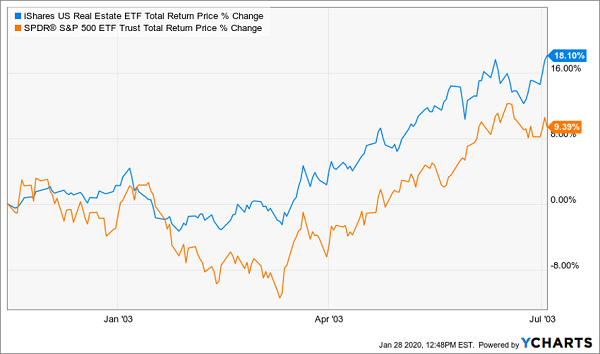
You can see this resilience again today: REITs have surged since the first case of coronavirus hit the headlines on December 31:
… And Have Outperformed This Time, Too
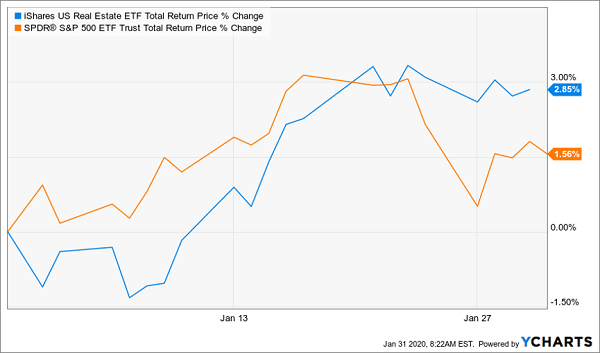
The best part is that IYR yields 3% today, nearly double the 1.7% you get from the typical S&P 500 stock. So you’re getting more of your return in cash, not paper gains.
But we’re not going to go the ETF route today. By going one step further, we can bag dividends that crush IYR’s 3% payout. Plus we’ll set ourselves up for greater upside, too.
I showed you a simple way to do this in last Tuesday’s article, with three REIT-owning closed-end funds (CEFs) trading at big discounts now. Those three funds, you may remember, pay a gaudy 7% average dividend, and two of them even pay dividends monthly!
But that was last week. Right now, I’m going to show you how to find the steadiest individual REITs, with the highest yields, fastest-growing dividends and biggest upside, too.
Step 1: “Stress Test” Your REIT Before You Buy
It sounds obvious, but the best way to find REITs that will hold their own, or rise, in the next crisis is to look at how they did in the last one.
Lucky for us, National Health Investors (NHI), which finances seniors’ housing and medical facilities across the US, was around when SARS hit 18 years ago. Back then, it returned 19% in eight months, beating the S&P 500 (in orange below) and REIT benchmark IYR (in red):
NHI Soared 19% in the SARS Scare …
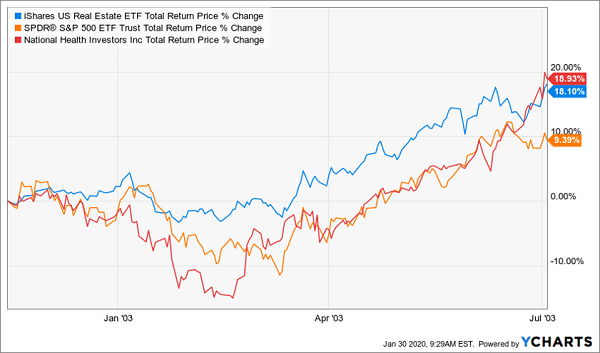
Truth is, we don’t have to go back nearly two decades to see NHI’s “pullback-proof” chops. Look at how it performed in the late-2018 crash.
… And the 2018 Pullback
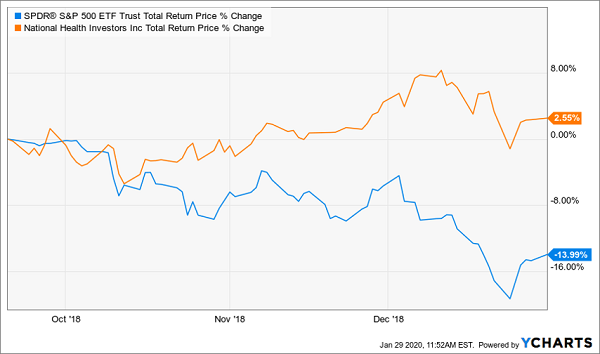
That’s right: while S&P 500 investors watched their nest egg shrivel 14%, NHI owners made money.
I know what you’re thinking here: past performance isn’t the be-all and end-all for gauging future performance. I get it—so here’s one more thing that’ll give you peace of mind: NHI’s “beta” rating: the stock sports a beta of 0.25, compared to the market, whose beta is (always) 1. In other words, NHI is 75% less volatile than the typical stock!
We’re not going to stop there, though, because we also want to make sure our REIT dividends are safe. Here’s an easy way to do that.
Step 2: Use This to “Inoculate” Your Payouts
Earnings per share isn’t the best measure for REITs. Instead, we want to focus on funds from operations (FFO)—a snapshot of the cash a REIT is generating. And we can ensure our dividends are safe (and better yet primed for growth) by looking at a REIT’s “payout ratio”: its per-share payout as a percentage of FFO.
To see how this plays out with an actual REIT, consider another senior-care landlord, Omega Healthcare Investors (OHI), which has handed members of my Contrarian Income Report service an outsized 62% total return since my first recommendation in August 2015. And thanks to its outsized dividend (current yield: 6.2%), more than 70% of that gain has been in cash.
In the last four quarters, OHI generated adjusted FFO of $3.02 a share and paid $2.64 in dividends, for an 87% payout ratio. That might sound high, but ratios like that are common in REIT-land, because many REITs, including OHI, get steady, predictable cash flows from their investments.
Step 3: Buy “Dividend Rubber Duckies”
Our last step applies to any stock, not just REITs. And it’s something that, if you’ve been reading my articles for a while, you’ll be able to recite by heart: “A rising dividend is the No. 1 driver of share prices.”
Buying a surging dividend makes more sense in a crisis because dividend-growers are the “rubber duckies” of the investment world: their share prices may fall in the short term, but in the long run, a rising dividend will pop them back up.
Consider one of my favorite “dividend rubber duckies,” American Tower (NYSE:AMT), a REIT members of my Hidden Yields service know well: AMT handed them a 48% return in a little over two years, thanks to the cell-tower owner’s relentlessly rising dividend, which gets hiked every quarter!
AMT’s “Dividend Escalator” Rolls On
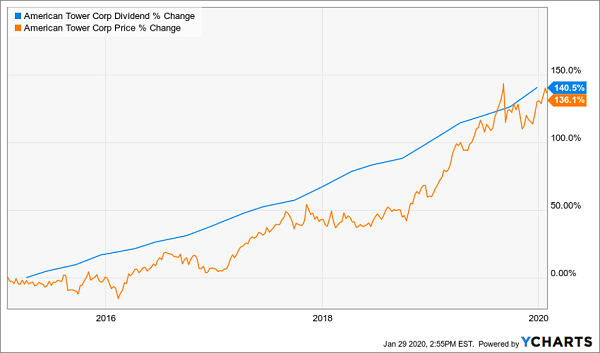
The late 2018 crisis? No problem. AMT rode its rising payout straight through:
Market Sinks, AMT Floats
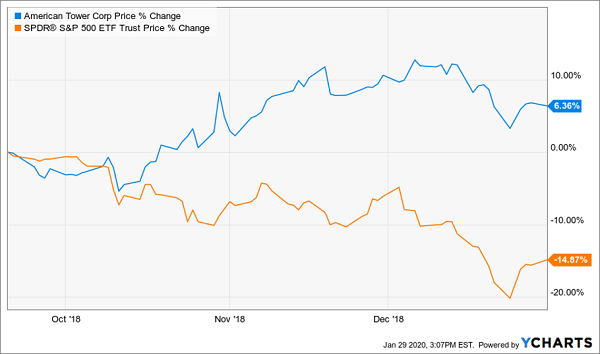
To be honest, your timing couldn’t be better here, because I’ve just released my latest selection of stocks I see as perfectly positioned to thrive in this (or any) crisis, while paying you retirement-changing dividends up to 9.8%!
Let’s move on to those now.
Yours Now: 5 “Pullback-Proof” Dividends Up to 9.8%
Worrying times like these are precisely why I built my 5-stock “Pullback-Proof” portfolio. The 5 ironclad stocks you’ll find there give you 2 things you need to protect your nest egg in a meltdown:
- Rock-solid (and growing) 8% dividends, on average—enough to hand you $40,000 a year in income on a $500K nest egg! That could let you retire without selling any shares at all, so you can forget about having to watch the market like a hawk.
- Share prices that don’t crumble beneath your feet while you’re collecting these massive payouts. In fact, I fully expect 7% to 15% average yearly price gains from these 5 “steady Eddie” picks.
And, yes, REITs play a big role in this 5-stock portfolio, including one of my favorites, which yields an incredible 9.8% now.
It’s a savvy lender that holds residential and commercial mortgages. It hedges its risk by devoting a large percentage of its portfolio to securities issued by Ginnie Mae, Fannie Mae or Freddie Mac.
That puts Uncle Sam on the hook for any defaults, not my pick!
And here’s the ultimate “pullback-proof” test: in 2018, a year most investors would rather forget, this steadfast REIT actually made money!
“Pullback-Proof” Pick Shines in a Tough Year
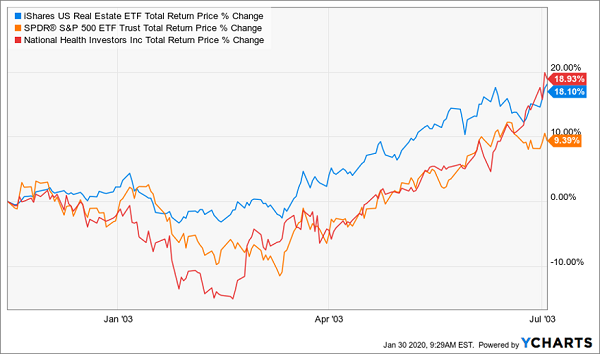
With another turbulent year on tap—no matter what happens with the coronavirus—now is the perfect time to stabilize your portfolio (and boost your income) with this cash machine and the 4 other buys in this unique “pullback-proof” portfolio.
Disclosure: Brett Owens and Michael Foster are contrarian income investors who look for undervalued stocks/funds across the U.S. markets. Click here to learn how to profit from their strategies in the latest report, "7 Great Dividend Growth Stocks for a Secure Retirement."
